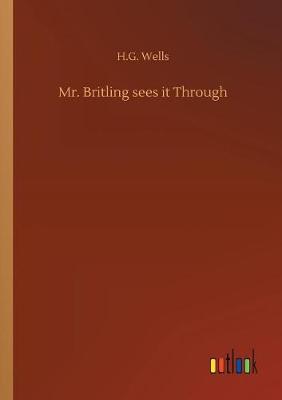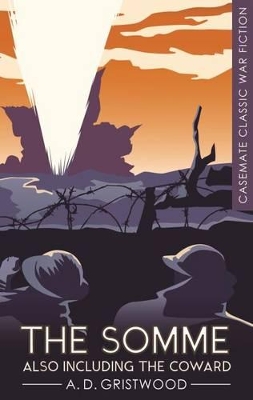Casemate Classic War Fiction
1 primary work • 2 total works
Book 7
Mr Britling Sees It Through was first published in 1916.
Set in the summer of 1914 the main hero, Mr Britling, is an eccentric writer whose days are spent at luxurious house parties socialising with a lot of international guests. When he bores of these careless days of nothing to do except eat, drink and be merry he can travel abroad where his mistress is patiently waiting for him to stop by.
However, the clouds of war have started to set in as Germany marches into Belgium and Europe is no longer the safe and fun haven that it once was. It is soon brought home to Mr Britling that war is not just an inconvenience to his lifestyle but also a danger to the people he loves. What can he do, though? All he's ever done is write, travel or attend parties; surely the world needs someone who has done more than that?
Set in the summer of 1914 the main hero, Mr Britling, is an eccentric writer whose days are spent at luxurious house parties socialising with a lot of international guests. When he bores of these careless days of nothing to do except eat, drink and be merry he can travel abroad where his mistress is patiently waiting for him to stop by.
However, the clouds of war have started to set in as Germany marches into Belgium and Europe is no longer the safe and fun haven that it once was. It is soon brought home to Mr Britling that war is not just an inconvenience to his lifestyle but also a danger to the people he loves. What can he do, though? All he's ever done is write, travel or attend parties; surely the world needs someone who has done more than that?
The Somme Also Including the Coward
by Arthur Donald Gristwood and H.G. Wells
Published 15 June 2016
‘The million British dead have left no books behind. What they felt as they died hour by hour in the mud, or were choked horribly with gas, or relinquished their reluctant lives on stretchers, no witness tells. But here is a book that almost tells it……Mr Gristwood has had the relentless simplicity to recall things as they were; he was as nearly dead as he could be without dying, and he has smelt the stench of his own corruption. This is the story of millions of men – of millions.’ – H. G. Wells, from the preface
In The Somme and its companion The Coward, first published in 1927, the heroics of war and noble self-sacrifice are completely absent; replaced by the gritty realism of life in WWI for the ordinary soldier, and the unflinching portrayal of the horrors of war. Written under the guidance of the master storyteller H. G. Wells, they are classics of the genre.
The Somme revolves around a futile attack in 1916 during the Somme campaign. Everitt, the central protagonist is wounded and moved back through a series of dressing stations to the General Hospital at Rouen. Both in and out of the line he behaves selfishly and unheroically, but despite this his circumstances and the conditions around him make his actions easy to understand. Based on A D Gristwood’s own wartime experiences, critics have said that few other accounts of the war give such an accurate picture of trench life.
The Coward concerns a man who shoots himself in the hand to escape the war, during the March 1918 retreat – an offence punishable by death. He gets away with it, but is haunted by fear of discovery and self-loathing.
In The Somme and its companion The Coward, first published in 1927, the heroics of war and noble self-sacrifice are completely absent; replaced by the gritty realism of life in WWI for the ordinary soldier, and the unflinching portrayal of the horrors of war. Written under the guidance of the master storyteller H. G. Wells, they are classics of the genre.
The Somme revolves around a futile attack in 1916 during the Somme campaign. Everitt, the central protagonist is wounded and moved back through a series of dressing stations to the General Hospital at Rouen. Both in and out of the line he behaves selfishly and unheroically, but despite this his circumstances and the conditions around him make his actions easy to understand. Based on A D Gristwood’s own wartime experiences, critics have said that few other accounts of the war give such an accurate picture of trench life.
The Coward concerns a man who shoots himself in the hand to escape the war, during the March 1918 retreat – an offence punishable by death. He gets away with it, but is haunted by fear of discovery and self-loathing.

